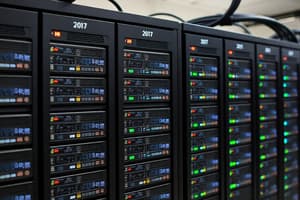Podcast
Questions and Answers
What is the primary purpose of schema attributes in Active Directory?
What is the primary purpose of schema attributes in Active Directory?
- To store information about objects (correct)
- To delegate authority
- To configure network settings
- To define user permissions
Container objects in Active Directory can only organize users.
Container objects in Active Directory can only organize users.
False (B)
Name one of the three container objects found in Active Directory.
Name one of the three container objects found in Active Directory.
Organizational Units
An OU can organize multiple objects into logical ________ groups.
An OU can organize multiple objects into logical ________ groups.
Match the following terms with their descriptions:
Match the following terms with their descriptions:
What is a primary reason small and medium businesses prefer a single domain structure?
What is a primary reason small and medium businesses prefer a single domain structure?
Leaf objects in Active Directory represent security accounts, network resources, and GPOs.
Leaf objects in Active Directory represent security accounts, network resources, and GPOs.
What is the primary administrative unit of Active Directory?
What is the primary administrative unit of Active Directory?
The broadest logical Active Directory component is the ______.
The broadest logical Active Directory component is the ______.
Which Active Directory feature helps manage users, computers, and resources?
Which Active Directory feature helps manage users, computers, and resources?
Directory partitions hold the same type of data and are managed by a single process.
Directory partitions hold the same type of data and are managed by a single process.
Match the following terms with their definitions:
Match the following terms with their definitions:
What are the two types of objects in Active Directory?
What are the two types of objects in Active Directory?
Which of the following OUs is created by default in Active Directory?
Which of the following OUs is created by default in Active Directory?
A leaf object in Active Directory can contain other objects.
A leaf object in Active Directory can contain other objects.
What are the two default users stored in the 'Users' folder in Active Directory?
What are the two default users stored in the 'Users' folder in Active Directory?
The ___ OU is designed to house user accounts from other domains.
The ___ OU is designed to house user accounts from other domains.
What is the primary purpose of Managed Service Accounts in Active Directory?
What is the primary purpose of Managed Service Accounts in Active Directory?
Match the following Active Directory objects with their descriptions:
Match the following Active Directory objects with their descriptions:
Why might larger companies use multiple domains within Active Directory?
Why might larger companies use multiple domains within Active Directory?
Nesting OUs in Active Directory helps in building a structure that simplifies object management.
Nesting OUs in Active Directory helps in building a structure that simplifies object management.
Which of the following is NOT a leaf object commonly created in Active Directory?
Which of the following is NOT a leaf object commonly created in Active Directory?
A local user account can access resources across an entire domain.
A local user account can access resources across an entire domain.
What are the two built-in user accounts created by Windows?
What are the two built-in user accounts created by Windows?
A ______ account represents a computer that is a domain controller or domain member.
A ______ account represents a computer that is a domain controller or domain member.
Match the following objects with their descriptions:
Match the following objects with their descriptions:
What is the primary purpose of groups in Active Directory?
What is the primary purpose of groups in Active Directory?
The 'Guest' account is used for administrative access by default.
The 'Guest' account is used for administrative access by default.
What defines the level of access users have to resources in Active Directory?
What defines the level of access users have to resources in Active Directory?
What is created when the first domain controller is installed in a forest?
What is created when the first domain controller is installed in a forest?
Intrasite replication occurs between domain controllers in different sites.
Intrasite replication occurs between domain controllers in different sites.
What is the function of the Knowledge Consistency Checker (KCC) in Active Directory?
What is the function of the Knowledge Consistency Checker (KCC) in Active Directory?
The first domain controller in a forest serves as a _____ server.
The first domain controller in a forest serves as a _____ server.
Which type of replication occurs between two or more sites?
Which type of replication occurs between two or more sites?
Match the following Active Directory components with their functions:
Match the following Active Directory components with their functions:
What allows users to log on to computers in any domain using their user principal name?
What allows users to log on to computers in any domain using their user principal name?
Only larger organizations require an Active Directory structure composed of several domains and trees.
Only larger organizations require an Active Directory structure composed of several domains and trees.
Flashcards are hidden until you start studying
Study Notes
Designing the Domain Structure
- A single domain is typically recommended for small and medium businesses.
- A single domain is easy to manage, requires less administration and is less expensive than a multi-domain structure.
Directory Services
- A directory service is a database that stores network resource information and can be used to manage users, computers, and resources.
- Active Directory Domain Services role can be installed using Server Manager.
- The first domain controller installed on a network creates a new domain, forest, and tree.
- The data in Active Directory is structured and organized using objects.
Different Types of Objects
- There are two main types of objects in Active Directory: container objects and leaf objects.
- Leaf Objects usually represent security accounts, network resources, and Group Policy Objects (GPOs).
- Container Objects are used to organize and manage users and resources and act as administrative and security boundaries.
Three types of container objects:
- Organizational Units (OUs)
- Folder Objects
- Domain objects
Organization Units (OUs)
- A primary container object used for organizing and managing resources within a domain.
- They allow the administration to group multiple objects and apply specific policies relevant to those objects.
- It is possible to delegate authority to manage an OU and build a hierarchical Active Directory structure for ease of management.
Folder Objects
- Five types of folder objects are created by default:
- Builtin
- Computers
- Foreign Security Principals
- Managed Service Accounts
- Users
Domain Objects
- Represents the logical structure of Active Directory.
- Contains OUs, Folder Objects, and leaf objects.
- Larger companies may use multiple domains to ensure secure boundaries, differentiate administration, and define policies.
Leaf Objects
- Leaf objects do not contain any further objects. Common Leaf objects :
- Security Accounts: Users, Groups, Computers
- Network Resources: Servers, Domain Controllers, File Shares, Printers,
- GPOs
- Contacts
- Printers
- Shared Folders
User Accounts
- Contains information related to a user such as group memberships, account restrictions, profile path, and dial-in permissions.
- Authentication confirms a user’s identity and determines the level of access they have.
- Local User Accounts provide access to resources on a specific computer.
- Domain User Accounts provide a single logon for users to access resources within the domain.
- Two built-in user accounts are: Administrator and Guest
Groups
- Represents a collection of users with similar permissions and rights.
- Permissions determine resource access and level of access.
- Rights determine the type of actions a user can perform.
- Groups are used to assign permissions and rights to multiple users at once, improving efficiency.
Computer Accounts
- A computer account represents a computer within the domain.
- Helps authenticate, manage and identify computers connected to the domain.
Forests, Trees, and Domains
- Smaller organizations focus on OUs and child objects.
- Larger organizations might require a complex structure using multiple Domains, Trees, and Forests.
- The installation of the first domain controller creates a new forest, tree and the root domain.
Active Directory Replication
- The process of maintaining a consistent set of information across different locations within the directory database.
- Intrasite replication: occurs within the same site.
- Intersite replication: occurs between different sites.
- Multimaster replication: used for replacing objects in Active Directory.
- Knowledge Consistency Checker (KCC): runs on all DCs to determine replication topology.
The Global Catalog Server
- The first domain controller installed is automatically designated as a Global Catalog server.
- Global Catalog servers perform the following:
- Facilitates domain and forest-wide searches.
- Facilitates logon across domains. Allows users to log in to computers in any domain using their User Principal Name (UPN).
Studying That Suits You
Use AI to generate personalized quizzes and flashcards to suit your learning preferences.



